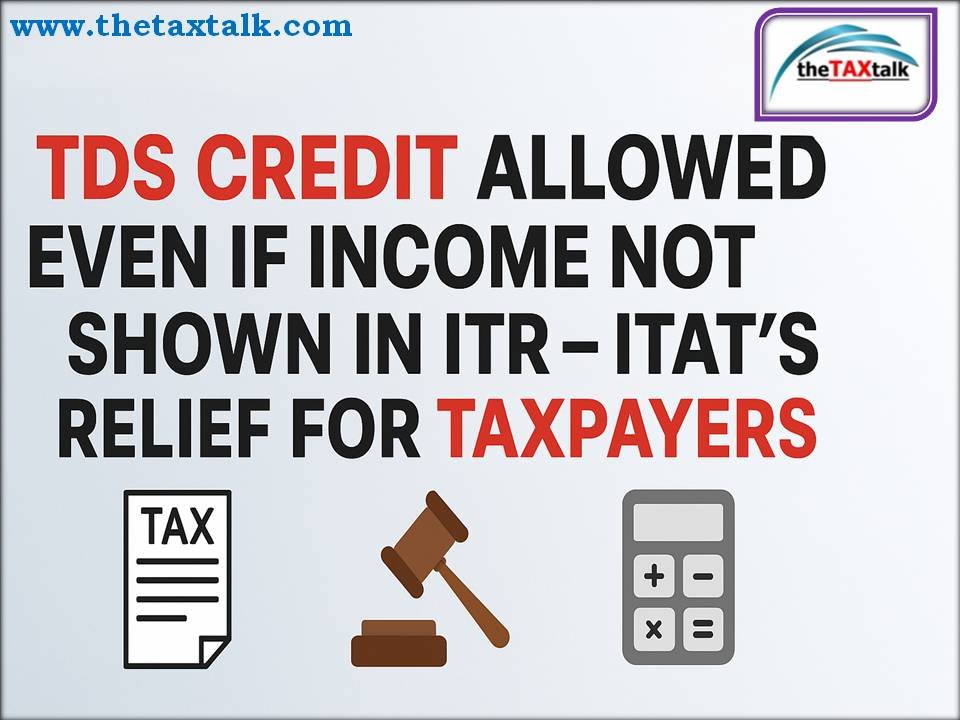![]()
TDS Credit Allowed Even if Income Not Shown in ITR – ITAT’s Relief for Taxpayers
Case: K. Venkatesan (HUF) vs. ACIT
Citation: [2025] 174 taxmann.com 449 (Chennai – Trib.)
Date: 07-05-2025
The Story in a Nutshell
An assessee sold agricultural land – a transaction that is completely exempt from income tax since agricultural land (in rural areas) is not considered a “capital asset” under the Income-tax Act.
However, the purchaser, perhaps unaware of this exemption, deducted 1% TDS on the sale consideration under section 194-IA, which generally applies to the purchase of immovable property other than agricultural land.
When the assessee claimed credit for the TDS as reflected in Form 26AS, the Assessing Officer (AO) refused to allow it. The AO’s reasoning was simple –
“You didn’t even show this exempt income in your ITR, so you can’t take credit for TDS.”
The dispute reached the Income Tax Appellate Tribunal (ITAT), Chennai.
What the Law Says
1. Section 194-IA– Purchaser must deduct TDS @ 1% on sale of immovable property, except agricultural land.
2. Section 199– Credit for TDS shall be given to the person from whose income tax has been deducted.
3. Rule 37BA– TDS credit is allowed for the year in which income is assessable; if income is exempt, credit is still given in the year of deduction.
What Went Wrong Here
• Purchaser’s mistake:Deducted TDS on agricultural land sale (not required).
• Assessee’s omission:Did not reflect the sale amount under “Exempt Income” in the ITR schedule.
• AO’s stance:No reporting of income → No TDS credit.
Tribunal’s Observations
• Fact Check:Section 194-IA does not apply to agricultural land; thus, the TDS deduction itself was unnecessary.
• Exemption Factor:Even though the income was exempt, it was still part of the assessee’s financial transactions for the year.
• Form 26AS Match:TDS credit was visible in Form 26AS and claimed in the return.
• Legal Position:Section 199 & Rule 37BA mandate giving credit for TDS once it is deducted and paid to the government, irrespective of whether the income is taxable or exempt.
The Verdict
The ITAT directed the AO to grant full credit of the TDS to the assessee as appearing in Form 26AS. The fact that the income was exempt or that it was not separately disclosed in the ITR did not take away the assessee’s right to the credit.
Practical Takeaways for Taxpayers
1. Always Disclose Exempt Income
Even if income is exempt (like sale of rural agricultural land), it’s good practice to report it under the “Exempt Income” schedulein the ITR to avoid unnecessary disputes.
2. TDS Credit Is a Right
If tax is deducted and deposited in your name, you are entitled to credit – regardless of whether the income is taxable or exempt.
3. Check Form 26AS & AIS Before Filing ITR
Any TDS entry in Form 26AS should either be claimed as credit or matched with income reporting in the return.
4. Purchaser Awareness Is Important
If you are selling agricultural land, inform the buyer in writingthat TDS under section 194-IA is not applicable – to avoid needless deduction and refund hassles.
A Word of Caution
While ITAT came to the rescue in this case, not reporting exempt income can create mismatches in AIS and ITR, triggering automated notices. In the age of AI-powered tax scrutiny, transparency is the best policy.
In short:
If the government has your money (via TDS), you’re entitled to get it back – taxable income or not. Just make sure your paperwork tells the full story.
The copy of the order is as under:

